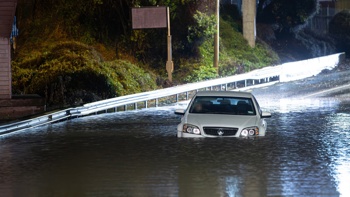National Party leader Judith Collins says the Government is proposing South Island water assets to be co-owned by Ngāi Tahu - a deal done "with no say by local residents".
Collins made the claim in a speech at the party's regional conference in Queenstown today.
It's the latest in a series of questions raised by Collins to highlight what she calls the Government's "radical interpretation" of the Treaty of Waitangi to grant sovereignty to iwi and have separate systems of governance.
"Everywhere we look, Labour is applying a perspective that the Treaty requires co-governance in policy, law, and in their communication with New Zealanders," Collins said in her speech today.
"This has the potential to be the biggest change to our democracy since our country was founded 181 years ago."
The Government has rejected Collins' questions as desperate politics, and said it is looking at ways to honour the partnership with Māori that the Treaty enshrined.
The Māori Party has gone further, accusing Collins of race-baiting - which Collins rejects, saying she is raising important issues.
Collins told the party's conference that the Department of Internal Affairs had presented the Government's preferred option for Three Waters reform to 23 mayors and South Island iwi.
"Some of the mayors were so appalled at what was presented, they have reached out to me," Collins said.
"The proposal would see all water infrastructure in the South Island consolidated into one organisation. This means councils that have invested in pipes, wastewater and drinking water facilities would see their assets gone.
"A document outlining this proposal, which I have acquired, proposes that the new Mainland water agency would be 50 per cent owned by Ngāi Tahu."
She released a document showing a joint governance group (JGG).
"Owners are the Canterbury councils and Ngāi Tahu, who are responsible for appointing representatives to the JGG," the document said.
The JGG would appoint a board, which "may have a specific Ngāi Tahu-appointed seat".
Collins said it would be one of four mega-agencies, similar to Auckland's Watercare, as part of the Three Waters proposal to manage water assets.
Ngāi Tahu was a "top-class organisation".
"But this is beside the point. Water assets are publically owned. Ngāi Tahu is not a publically owned organisation, and Labour's proposal is not based on Ngāi Tahu being the best organisation to manage the asset."
She said it was "a deal done behind closed doors with no say from local residents".
Collins has previously taken aim at the He Puapua report, which looks at how the Government can implement the UN's declaration on the rights of indigenous peoples, which New Zealand signed up to under a National Government.
Prime Minister Jacinda Ardern has said this report hasn't even made it to Cabinet yet, but has ruled out one of its options - a separate Māori parliament.
Ardern has also pushed back on Collins' criticisms of the proposed Māori Health Authority, which Collins has characterised around its veto power and Ardern describes as a partnership with the proposed entity Health NZ.
Collins has also questioned a draft proposal to transfer functions and powers within the conservation system to tangata whenua, and the Government's use of urgency to pass a law getting rid of a public veto on Māori wards.
Collins told the conference Treaty breaches had left a lasting legacy on Māori and righting the wrongs was necessary.
"A National Government under my leadership will work with Māori to address inequities.
"National has proven it can do this through initiatives like Kohanga Reo, Kura Kaupapa Māori, Whare Wananga and Whānau Ora, just to name a few."
Take your Radio, Podcasts and Music with you









